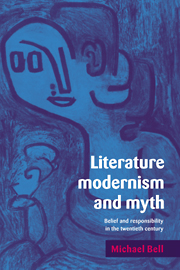3 - Countercases: T. S. Eliot and Ezra Pound
Published online by Cambridge University Press: 18 December 2009
Summary
The three writers considered so far offer a spectrum of mythopoeic possibilities, although others, such as Pablo Neruda, Rainer Maria Rilke or Wallace Stevens are equally relevant. To claim that mythopoeia, as defined in the preceding chapters, is central to modernism, is not to impose a monolithic account. There are authors for whom an emphasis on consciously inhabited world views is not primary; while in Kafka and Beckett the mythopoeic conception applies rather in a reverse or imploded mode. Finnegans Wake, although a monumental example of mid-century mythopoeia, is so completely focused at the level of language, is so intra-mythic, as to have moved away from the specific theme of personal conviction within a world view. None the less, mythopoeic consciousness, in the sense I have outlined, is a significant criterion by which to read other writers, as is evident from two borderline cases.
Pound and Eliot are among the first instances that spring to mind when thinking of myth in relation to Anglo-American modernism, yet both stand outside the definition formulated so far. For what is in question is not the use of myth, but its significance. To use myth is not necessarily to be mythopoeic, and may even pre-empt that possibility. What distinguishes both these poets, despite their mutual differences, from the three writers already considered may be approached through their attitudes to the linguistic turn. They had a common concern to ‘purify the language of the tribe’: through poetry and criticism, they wished to keep language rich, subtle and accurate as the public medium of expression and understanding. This ambition influenced the methods, and sense of purpose, of university English studies up to the mid-century. In retrospect, however, it assumed a very direct relation between linguistic form and cultural condition.
- Type
- Chapter
- Information
- Literature, Modernism and MythBelief and Responsibility in the Twentieth Century, pp. 120 - 147Publisher: Cambridge University PressPrint publication year: 1997



